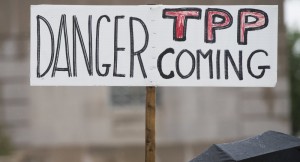 Three of The Worst TPP Clauses Explained in Plain English Three of The Worst TPP Clauses Explained in Plain English
by James Corbett
corbettreport.com
November 14, 2015
After years of secretive negotiations in closed-door meetings and James Bond-level shenanigans designed to keep the deal under lock and key, the full text of the Trans-Pacific Partnership Agreement has finally been released for public scrutiny. Now the clock has started as each country pushes the deal through their legislatures for ratification. In the US, this means Obama can sign the agreement in 90 days and begin the push for Congressional approval early next year.
So have you had time to read through the text yet? Congratulations! And have you managed to break down the wall of legalese and figure out how this is going to affect your life? Great! Then you can stop reading.
And now that that guy is out of the way, it’s time for the rest of us to roll up our sleeves and get to work. Don’t worry, though, I’ve compiled a cheat sheet for you. So without further ado, here are three clauses from the TPP text that show the deal is worse than we feared.
1. The Investor-State Dispute Settlement Mechanism Is Worse Than We Feared
The legalese:
1. If an investment dispute has not been resolved within six months of the receipt by the respondent of a written request for consultations pursuant to Article 9.17.2 (Consultation and Negotiation) [. . .] that the claimant has incurred loss or damage by reason of, or arising out of, that breach; and [. . .] provided that a claimant may submit pursuant to subparagraph (a)(i)(C) or (b)(i)(C) a claim for breach of an investment agreement only if the subject matter of the claim and the claimed damages directly relate to the covered investment that was established or acquired, or sought to be established or acquired, in reliance on the relevant investment agreement.
SOURCE: TPP Chapter 9 (Investment Chapter), Article 9.18
The Plain English:
The ellipses in the above paragraph are saving you from a pile of legal gibberish that obscure the real meaning of these clauses. Those adventurous souls who want to wade through the mountain of legalese are invited to click the link and read the whole clause for yourself. Don’t worry, I’ll wait.
. . .
Is your head hurting yet? Well, then, the negotiators have done their job!
Don’t worry, I’ll spare you the other six equally inscrutable paragraphs of Article 9.18 of the TPP text, “Submission of a Claim to Arbitration.” Does it help if I explain this is a description of the arbitration procedure laid out under the terms of the Investor-State Dispute Settlement (ISDS) mechanism of the deal? Yeah, I didn’t think so.
 What all the acronym-laden legalistic jargon is hiding here is arguably the most controversial part of the entire deal. This article lays out the terms under which a corporation that is unhappy with a law, ruling or regulation of a government can sue that government for its decision. What all the acronym-laden legalistic jargon is hiding here is arguably the most controversial part of the entire deal. This article lays out the terms under which a corporation that is unhappy with a law, ruling or regulation of a government can sue that government for its decision.
Perhaps it’s easier to understand why this is so controversial if we look at a real life example.
When German public sentiment turned strongly against the use of nuclear power in the wake of the Fukushima disaster, the German government committed to “Atomausstieg” (Nuclear Exit), a plan to close down all of the country’s nuclear power plants by 2021. Eight of the oldest nuclear plants were shut down right away, including two that were owned and operated by Swedish energy major Vattenfall. Vattenfall didn’t like this and is currently suing the German government for $6 billion in losses from the decision. They were able to do this under the terms of a World Bank mechanism called the Convention on the Settlement of Investment Disputes Between States and Nationals of Other States which arbitrates disputes between corporations and governments and which is specifically cited in the TPP’s Article 9.18 as one of the mechanisms that corporations could use to sue TPP member governments.
In fact, this dispute settlement mechanism has been around for 50 years, is included in a number of free trade deals and has already been used to sue various governments. As citizen.org points out, taxpayers have already paid our $440 million to corporations for grievous offences like banning a neurotoxic gasoline additive or failing to grant drug monopolies to Big Pharma.
So how could this play out if the TPP goes into effect? Well, that’s the rub. Given the incredibly vague wording of the agreement, including a nebulous definition of “investment” itself, just about any company could bring a lawsuit against just about any government for just about any policy, ruling, procedure or law that it believes cuts into its potential profits, no matter how loosely. One possible example: tobacco companies suing TPP member governments for forcing them to sell cigarettes in plain packaging, thus “violating” their trademarks and intellectual property.
Fully aware of how damaging this clause could be, four countries (Australia, Canada, Mexico and New Zealand) have carved out exceptions in Annex 9-H of the final text to grant exemptions for certain laws passed under certain conditions. Australia, for example, grants itself an exemption for any decision made under its existing laws governing foreign acquisitions and takeovers, presumably meaning that a foreign company can’t sue Australia for denying a forceful takeover of an Australian company. But as others have pointed out, the existence of such exemptions merely serves to underscore that everything that is not specifically exempted is fair game, which is just about any environmental or health regulation that might affect a major company’s bottom line.
2. Intellectual Property Provisions Are Worse Than We Feared
The legalese:
With respect to the functions referred to in paragraph 2(c) and paragraph 2(d), these conditions shall include a requirement for Internet Service Providers to expeditiously remove or disable access to material residing on their networks or systems upon obtaining actual knowledge of the copyright infringement or becoming aware of facts or circumstances from which the infringement is apparent, such as through receiving a notice of alleged infringement from the rightholder or a person authorised to act on its behalf.
SOURCE: TPP Chapter 18 (Intellectual Property Chapter), Article 18.82 paragraph 3(a)
In plain English:
This section extends the US’ rules for dealing with allegations of copyright infringement on the internet to most of the rest of the TPP area (with exceptions made for Canada’s and Chile’s pre-existing rules). Under the US law, known as the Digital Millennium Copyright Act or DMCA, “safe harbor” is provided to Internet Service Providers that respond to notices from copyright holders by pre-emptively taking down the allegedly offending material, even if it does satisfy requirements under applicable Fair Use laws. In effect, ISPs are turned into “copyright cops” who are obliged to take down anything that anyone claims to have copyright over at any time, before any review of the material or its use takes place.
This means, for example, that governments can have politically embarrassing material or critical reports scrubbed from the web by merely claiming (even falsely) that the report reproduces “copyrighted” material like government documents or broadcasts of government committee hearings. Sound far-fetched? As the Electronic Frontiers Foundation has documented this is exactly how these types of laws have been used dozens of times, as when the Canadian Auditor General demanded the takedown of newspaper reports that published a section of a government report on immigration or DHS demanded the takedown of “conspiracy theory” videos on YouTube that were critical of the US government.
 Worse, the provision provides for no counter-notice mechanism other than what already exists within each country. As Fight For the Future explains: “a U.S company could order a website to be taken down in another country, and there would be no way for the person running that website to refute their claims if, say, it was a political criticism website using copyrighted content in a manner consistent with fair use.” Worse, the provision provides for no counter-notice mechanism other than what already exists within each country. As Fight For the Future explains: “a U.S company could order a website to be taken down in another country, and there would be no way for the person running that website to refute their claims if, say, it was a political criticism website using copyrighted content in a manner consistent with fair use.”
Sadly, the copyright notice clause is only one of many, many troubling provisions in the “Intellectual Property” chapter of the agreement. Some of the other nightmares in the chapter include:
Article 18.28, which strips privacy protections from owners of country code top level domains (i.e. websites ending with .jp, .ca., .au, etc.);
Article 18.63, which extends the “Mickey Mouse Protection Act” (i.e., copyright protection for 70 years after the death of the author) to the TPP area;
Article 18.68, which criminalizes circumvention of Digital Rights Management technologies, including jailbreaking your own phone or ripping your own Blu-Ray to your own computer; and
Article 18.78, which essentially criminalizes online journalism and whistleblowing by making it illegal to disclose “trade secrets” via computers.
These provisions serve no other purpose than to further stifle free speech, private property rights, and creative expression throughout the TPP area. If only someone had told the negotiators that intellectual property doesn’t exist.
3. Rules for Lowering Food Safety Standards Are Worse Than We Feared
The legalese:
Each Party shall ensure that its sanitary and phytosanitary measures either conform to the relevant international standards, guidelines or recommendations or, if its sanitary and phytosanitary measures do not conform to international standards, guidelines or recommendations, that they are based on documented and objective scientific evidence that is rationally related to the measures, while recognising the Parties’ obligations regarding assessment of risk under Article 5 of the SPS Agreement.
SOURCE: TPP Chapter 7 (Sanitary and Phytosanitary Measures), Article 7.9 Paragraph 2
In Plain English:
This chapter of the TPP lays out guidelines for harmonizing rules and procedures related to food safety and animal and plant health amongst TPP nations. Like so much else in the TPP, it contains language that at first glance is comforting to those who are concerned about food safety regulations and other laws that have a direct impact on our health. After all, who doesn’t want to ensure that such laws are based on “objective scientific evidence”? But the devil, as always, is in the details, and what exactly constitutes “objective scientific evidence” is, as always, left in the hands of whoever adjudicates disputes in this area.
In this case, such disputes are covered in a paragraph later in the chapter that obligates food inspectors to notify exporters any time they deny entry of a product and to provide documentation of that decision showing that it “is limited to what is reasonable and necessary, and is rationally related to the available science” on the subject. This, of course, leaves ample opportunity for challenges to these findings that leave the science in the hands of adjudicators.
 What happens if, for example, a country like Japan wants to maintain strict controls over GMO food imports? The deal, although not obligating a change in any particular food safety regulation that is already in place, would allow exporters to challenge any decision that it did not deem to be “related to the available science.” And since the “available science” on GMOs has been heavily skewed by corporate influence of the biotech companies, it is entirely plausible that this chapter will allow the opening up of the entire region to GMO foods. What happens if, for example, a country like Japan wants to maintain strict controls over GMO food imports? The deal, although not obligating a change in any particular food safety regulation that is already in place, would allow exporters to challenge any decision that it did not deem to be “related to the available science.” And since the “available science” on GMOs has been heavily skewed by corporate influence of the biotech companies, it is entirely plausible that this chapter will allow the opening up of the entire region to GMO foods.
As Debbie Barker of the Center for Food Safety told Food Safety News earlier this month, the language of the text leaves it open for Big Agra to challenge any food safety decision, “even laboratory food safety testing and the new food import rules under the Food Safety Modernization Act.”
The bad news is compounded when combined with the Investor-State Dispute Settlement mechanism described above. If an exporter believes their food product is being unfairly blocked and the adjudicators agree that it has not been held back for reasons “related to the available science” then it is possible for those companies to sue for lost profits.
Once again, this is not a theoretical concern. Last year Monsanto and Dow joined forces to sue Maui for placing a moratorium on GMO cultivation on the island.
Conclusion
These are just a few examples of the truly destructive clauses of this TPP agreement.
The Good News: The deal has not been ratified yet, so there is still time to stop it, exactly as ACTA was stopped after massive protests made it politically unviable.
The Bad News: If you’ve read this far you are now among the rarefied sliver of a percentage point of the public who has read even one paragraph of the deal, let alone understands anything about it. Without mass education on this subject, it is unlikely that such massive protests can derail this TPP deal. Given the amount of time, money and energy the multinationals have sunk into the negotiation of this agreement, one thing is for sure: It’s not going down without a fight. |













This story, although not as easy to understand as some might like or need, is still a good place to get started for many. Obviously I’m a subscriber but how can we put this kind of quality reporting out on other social media sites, e.g. G+, Facebook, etc. to help find a larger audience? I love JC’s work and will continue to support but we need all who can comprehend to have a chance to ponder the information presented here.
Thanks for the comment and the support. All of the subscriber editorials are available for free access on theinternationalforecaster.com. You can spread the Forecaster link if you’re looking to share this with other people:
http://theinternationalforecaster.com/International_Forecaster_Weekly/Terrible_TPP_Clauses_Explained_in_Plain_English
Thank you for this article and for translating a layman version. As we manage high traffic digital properties it is most concerning.
i know it sounds rather Pollyannaish, but I’ve emailed our new Canadian Prime Minister encouraging him to walk away from the TPP and NATO. This is pretty old-school political engagement, but i figure the PMO looks at these messages and at least tabulates them, applies a multiplier formula to reflect the number of other Canadians who feel the same way on an issue (but whose hands have atrophied since letter-writing has gone obsolete) and briefs the PM. Every little pebble dropped in the pond makes a ripple.
The more important action is to share this information widely in ones social sphere. That’s the most effective multiplier.
Thank you so much, James, for doing the heavy lifting for all of us. Very admirable and praiseworthy.
As they say about that other James, you are the hardest working man in the buisness.
Keep up the great work!
from a recent article by Global Research, see http://www.globalresearch.ca/the-mega-regional-trade-agreements-ttp-ttip-vs-bilateral-investment-treaties/5514750, i found a very informative ebook about BITs, bilateral investment treaties, that may be downloaded for free at http://www.bothends.org/uploaded_files/inlineitem/Rethinking-BIT-Book_epub.epub. at the time of writing, 3200 BITs existed, 10% of which registered in the netherlands with its 12,000 letterbox companies containing €3,700 billion of foreign direct investment.
relax, bombing the post office will not hurt this concentration of evil.
it so appears that ttp/ttip-like constructs have grown and developed over decades, and a lot of experience exists around the destruction these ideas may bring about. the examples speak for themselves.
ad.